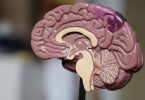The Mazatec people of Oaxaca, Mexico, traditionally used Salvia divinorum for medicinal and spiritual purposes. [1] The key component is diterpene salvinorin-A. It is an agonist of kappa-opioid receptors in parts of the brain including the neocortex and thalamus. In 2015, the Spanish government funded an extraordinary study—with human volunteers—detailing the psychedelic and psychoactive effects of salvinorin-A. [1]
Salvinorin-A warrants special study compared to psychedelic substances that influence serotonin receptors, such as lysergic acid diethylamide (LSD), mescaline, psilocybin, and dimethyltryptamine (DMT). With this in mind, researchers contacted “individuals interested in altered states of consciousness” and their acquaintances.
A total of eight individuals (five female) answered the call. Each participant had experienced psychedelics without adverse effects. They underwent physical exams and urinalysis/breath analysis for interfering substances.
The researchers devised a vaporizer by heating a flask connected to a vacuum and rubber tube. They probed three doses of salvinorin-A against a placebo: 0.25, 0.5, and 1.0 mg. Although the participants were unaware of the dose (and the placebo was randomized), the salvinorin-A was administered in sequential doses for safety. Participants inhaled salvinorin-A or placebo for 30 seconds.
The authors employed Spanish versions of several tests, including those related to hallucinogenic effects, anxiety, and altered consciousness. The subjects rated intensity as “good” or “bad” in real time. Each participant wrote a subjective narrative of their experience.
They also reported interoceptive awareness, which refers to bodily and emotional awareness. The study defines it as “the primary internal representation of the physiological condition of the body.” It may relate to conditions including depression and anxiety. One notable aspect of interoceptive awareness is trusting, or “experiencing one’s body as safe and trustworthy.”
In all cases, maximum effects arrived after 2 minutes and dissipated after 20 minutes.
Psychedelic-related effects including oceanic boundlessness and hallucinations increased significantly with dose. Anxiety increased between placebo and the low-medium doses but was not significant between placebo and the high dose. Self-reported “‘bad effects’ did not show any effects of dose,” but “good effects” were significant with dose.
Trusting increased significantly at low and medium doses but decreased at the high dose. Body sensation also increased at the lower doses, but loss of body ownership occurred at the high dose. This suggests a biphasic effect where salvinorin-A exerts positive body awareness effects at low-medium doses but leads to out-of-body experiences at high doses.
Other key effects included disconnection from external reality, alternate realities, sophisticated visions, and intense auditory perceptions. Alterations in reality were sometimes perceived in the body. The narratives composed by each participant reveal stunning experiences:
- “I really wanted to be fully in that other reality, it was very familiar, like the reality of my childhood.”
- “I felt the presence of other life forms in that other world.”
- “The effects of the substance were approaching me, like an air blast, from the left. (…) they were distorting the objects in the room and also my body and sensations.”
- “There were magical beings in that world, wearing garish dresses, similar to the clothes of a royal court jester.”
- “I felt the sensation as if my face turned feline, and I was vibrating. Then the out of body experience started, and I had the sensation of my mind rising from behind and going to another place, leaving the envelope that was my body.”
Overall, the researchers conclude, kappa-opioid receptors play a significant role in body ownership and sensory perception in humans. The study highlights the power of this special substance from the natural world. [1]
Reference
- Maqueda AE, et al. Salvinorin-A induces intense dissociative effects, blocking external sensory perception and modulating interoception and sense of body ownership in humans. International Journal of Neuropsychopharmacology. 2015:1-14. [Impact Factor: 4.333; Times Cited: 40 (Semantic Scholar)]








